With the summer break comes more time for reading! The team at Positive Money Europe has compiled a list of books on monetary policy, banking and finance which are definitely worth adding to your reading list, if not straight into your luggage. Which one would you bring with you on holiday?
1) The end of banking by Jonathan McMillan
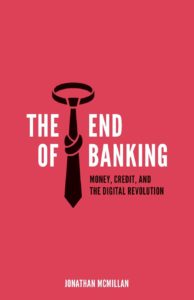 Jonathan McMillan is a pseudonym for the two authors of the book, who are financial and banking experts who gained experience in the financial centres of London and New York.
Jonathan McMillan is a pseudonym for the two authors of the book, who are financial and banking experts who gained experience in the financial centres of London and New York.
The book is a guide to the complexity of modern finance, explaining how the banking system as we know it cannot exist any longer. The authors affirm that in the digital age, banking has got out of control and that banking regulation is no longer effective, having been turned into a dysfunctional public–private project. For these reasons, radical reform is now needed more than ever.
Why we liked it: This book is simply one of Positive Money Europe’s bibles. Given its short length, ‘The end of banking’ is perhaps the most persuading book on the dire need for reforming the monetary and banking system. In their recommendations, the authors depart slightly from Positive Money’s historical standpoint, but only to make our case even stronger. As a bonus, after reading the book, you should be able to impress your friends by explaining to them how shadow banking works.
2) Do central banks serve the people? by François Cleaveau, Peter Dietsch and Clément Fontan
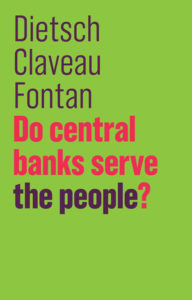 As part of Polity’s ‘Future of Capitalism’ series, this short book, written by a knowledgeable group of academics, addresses key questions surrounding central banks, including the degree of their contribution to economic inequality and their credibility.
As part of Polity’s ‘Future of Capitalism’ series, this short book, written by a knowledgeable group of academics, addresses key questions surrounding central banks, including the degree of their contribution to economic inequality and their credibility.
In particular, it explores the idea that the current template of the independence of central banks should be re-evaluated today in the light of the big role they played during the global financial crisis that started in 2007. Moreover, it offers an overview of how the degree of transparency has changed over the years, comparing the efforts made by the biggest central banks in the world.
Why we liked it: This book is a wake-up call for policymakers, central bankers and ordinary citizens. The authors unveil the false predictions and the inaccurate policy solutions implemented throughout these years, by following a methodical and well-documented approach, as well as outlining credible alternatives.
3) Money (the art of living) by Eric Lonergan
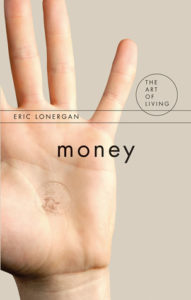 Eric Lonergan is a macro hedge-fund manager at M&G Investments in London. He is a frequent contributor to the Financial Times.
Eric Lonergan is a macro hedge-fund manager at M&G Investments in London. He is a frequent contributor to the Financial Times.
Money dominates our lives: we lend it, we work for it, we talk about it a lot and we hear about it in the news and in the streets. But how much do we really understand about money? What is our relationship with money? This elegantly written and thought-provoking book explores the nature of money, providing an updated definition of what it is and how it functions.
Through an interdisciplinary approach that embraces philosophy, finance and social sciences, in this lively read the author tackles questions such as ‘what is the purpose of finance?’ and ‘how does it affect our daily life?’, highlighting the inadequacies of modern economics.
Why we liked it: Eric is a talented writer who knows how to explain complex issues to everyone. His book will be equally inspiring for citizens, policymakers and financial sector insiders.
4) A diary of the euro crisis in Cyprus: lessons for bank recovery and resolution by Panicos Demetriades
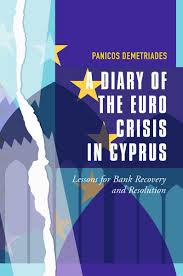 Panicos Demetriades served as Governor of the Central Bank of Cyprus and was a member of the Governing Council of the European Central Bank from May 2012 until stepping down from the governorship in Cyprus in April 2014. He returned to his academic position in the UK as Professor of Financial Economics at the University of Leicester shortly after.
Panicos Demetriades served as Governor of the Central Bank of Cyprus and was a member of the Governing Council of the European Central Bank from May 2012 until stepping down from the governorship in Cyprus in April 2014. He returned to his academic position in the UK as Professor of Financial Economics at the University of Leicester shortly after.
Drawing on his unique experience and knowledge, Demetriades presents a first-hand account of the events that shook Cyprus and the Eurozone when the crisis hit the Cypriot banks. As Charles Goodhart says in the preface, the chapters on the boiling point of the financial crisis give a vivid impression of the fog of uncertainty, pressure of time, lack of sleep and legal uncertainties, exploring the ‘human’ side of the crisis for those who tried to manage it.
In the end, the author insists in the final chapter that learning some important lessons specifically from the Cypriot experience will help to deal with future banking crises.
Why we liked it: this book is a must-read for multiple reasons. First, because it sheds light on the controversial decision to tax deposits directly from citizens (the ‘bail-in’) in a way that no one else has done until now. Second, because it paints a surprising picture about the reality of central bank independence (or lack thereof) in certain jurisdictions of the Eurozone. And last, because it reads like a fascinating novel.
5) Financial citizenship: experts, publics, and the politics of central banking by Annelise Riles
 Annelise Riles is the Executive Director of the Northwestern Roberta Buffett Institute for Global Affairs.
Annelise Riles is the Executive Director of the Northwestern Roberta Buffett Institute for Global Affairs.
The populist movements that are emerging in Europe and in the United States often target central banks as pain points of the current financial and economic troubles. In the meantime, inequality is rising, becoming almost intolerable for the majority of citizens. In this context, Annelise Riles sheds light on the current power dynamics within central banks and the political landscape, challenging the reader with a fundamental question: How can central banks regain trust from citizens?
Why we liked it: We were delighted to have Annelise as a guest speaker when we launched Positive Money Europe in May 2018, and later this year when we visited the European Central Bank. Annelise’s ideas for renewing the dialogue between citizens and central banks mirrors well the spirit of Positive Money Europe’s campaigns. All central bankers should read this book!
6) The economics of central banking by Livio Stracca
 Livio Stracca is currently the Deputy Director-General of International and European Relations at the European Central Bank and Adjunct Professor at the University of Frankfurt.
Livio Stracca is currently the Deputy Director-General of International and European Relations at the European Central Bank and Adjunct Professor at the University of Frankfurt.
This book explores some of the questions surrounding central banking by following a pedagogical structure that goes from the more established concepts to the most heated and problematic inquiries, enabling readers without specific knowledge to grasp the current and long-standing challenges central banks are facing. By referring to the most recent academic research and his first-hand experience as a central banker, Stracca touches upon topics such as the contribution of central banks to a country’s welfare, paper currency and the perspective of the disappearance of central banks.
Why we liked it: If you have ever wondered how people working in the ECB think central banks work and the challenges they are facing today, then Livio Stracca’s book – although not representative of the ECB’s views – is a good place to start. As its title suggests, this book will be primarily useful for (perpetual) economics students.
7) The case for people’s quantitative easing by Frances Coppola
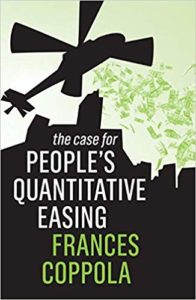 Frances Coppola is a well-known financial commentator who has worked in the banking sector for 17 years.
Frances Coppola is a well-known financial commentator who has worked in the banking sector for 17 years.
In this book, Frances Coppola deals with a topic Positive Money Europe holds dear. The author explores the reasons why ‘people’s quantitative easing’ (or helicopter money) can be the real and effective measure to restore crisis-hit economies and considerably improve people’s lives. As Coppola explains, by buying assets, quantitative easing (QE) has only benefited the wealthiest and has not reached ordinary people. When assets were sold, they were simply reinvested in other assets without any strong tangible effect on the real economy. The author explains why people’s QE can instead be the real game-changer for citizens during crisis times.
Why we recommend it: To be entirely honest, we have not yet received the book, but given that Frances Coppola is a very early supporter of QE for people (she spoke at our event in the European Parliament three years ago), we are confident we’re not at risk of disappointing you by recommending this book already.
These were our suggestions for this summer. Have you already read any of them? Did you like them? Which ones would you add to the list?
In the meantime, we wish you happy holidays!

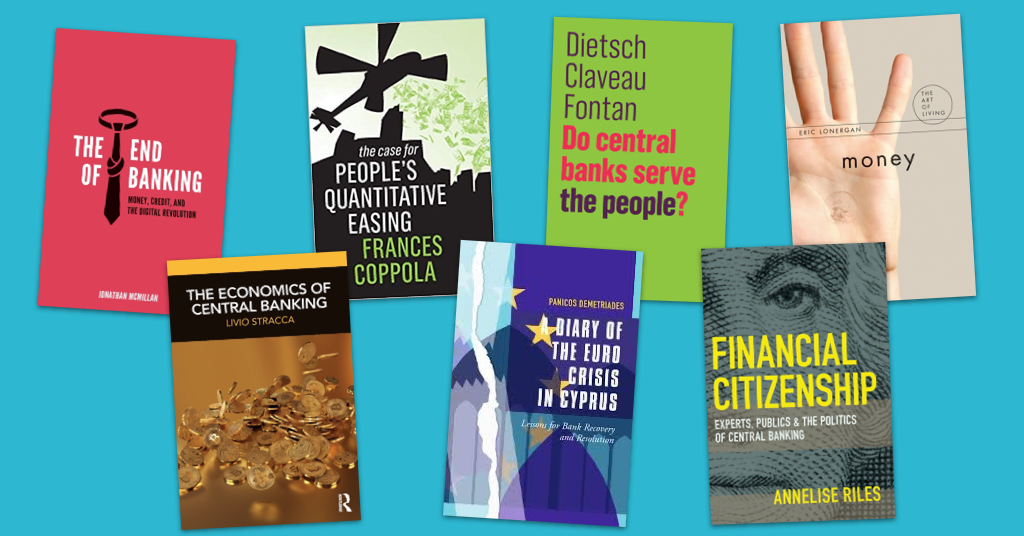
Haha! You haven’t even read the last book! Although, I admit it was already on my reading list.